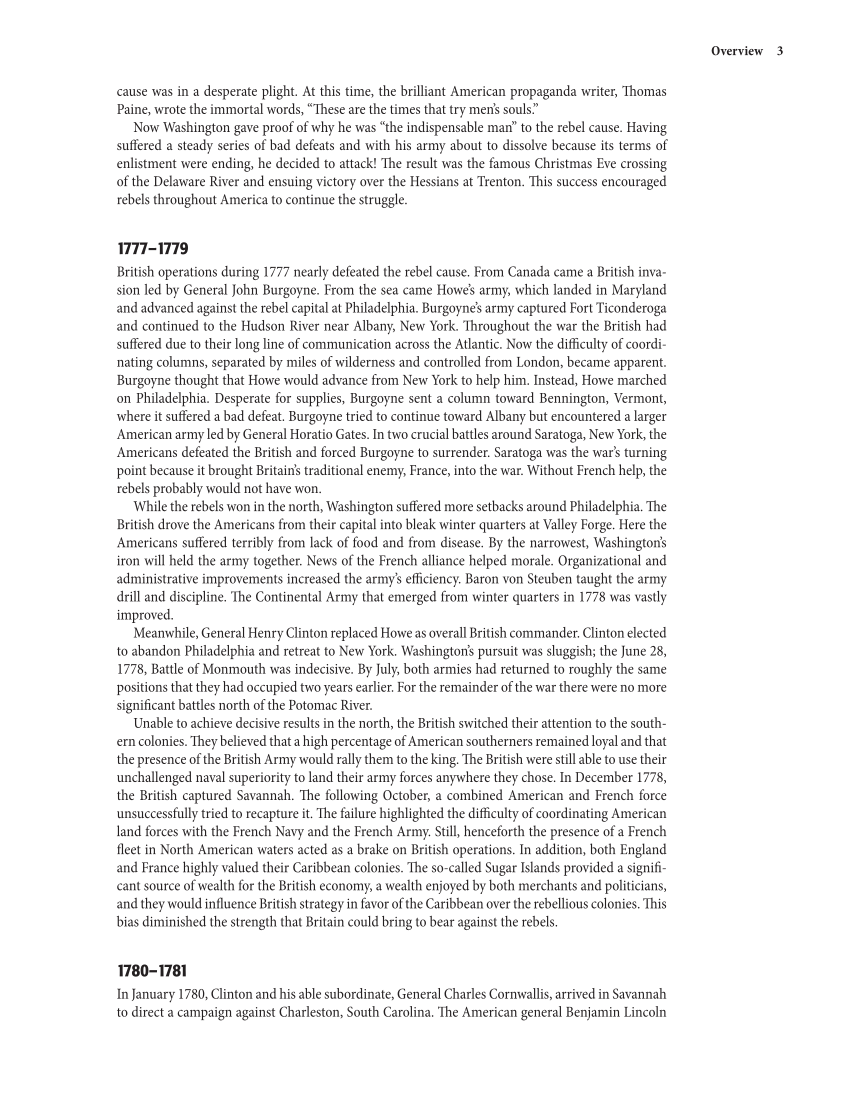Overview 3 cause was in a desperate plight. At this time, the brilliant American propaganda writer, Thomas Paine, wrote the immortal words, “These are the times that try men’s souls.” Now Washington gave proof of why he was “the indispensable man” to the rebel cause. Having suffered a steady series of bad defeats and with his army about to dissolve because its terms of enlistment were ending, he decided to attack! The result was the famous Christmas Eve crossing of the Delaware River and ensuing victory over the Hessians at Trenton. This success encouraged rebels throughout America to continue the struggle. 1777–1779 British operations during 1777 nearly defeated the rebel cause. From Canada came a British inva- sion led by General John Burgoyne. From the sea came Howe’s army, which landed in Maryland and advanced against the rebel capital at Philadelphia. Burgoyne’s army captured Fort Ticonderoga and continued to the Hudson River near Albany, New York. Throughout the war the British had suffered due to their long line of communication across the Atlantic. Now the difficulty of coordi- nating columns, separated by miles of wilderness and controlled from London, became apparent. Burgoyne thought that Howe would advance from New York to help him. Instead, Howe marched on Philadelphia. Desperate for supplies, Burgoyne sent a column toward Bennington, Vermont, where it suffered a bad defeat. Burgoyne tried to continue toward Albany but encountered a larger American army led by General Horatio Gates. In two crucial battles around Saratoga, New York, the Americans defeated the British and forced Burgoyne to surrender. Saratoga was the war’s turning point because it brought Britain’s traditional enemy, France, into the war. Without French help, the rebels probably would not have won. While the rebels won in the north, Washington suffered more setbacks around Philadelphia. The British drove the Americans from their capital into bleak winter quarters at Valley Forge. Here the Americans suffered terribly from lack of food and from disease. By the narrowest, Washington’s iron will held the army together. News of the French alliance helped morale. Organizational and administrative improvements increased the army’s efficiency. Baron von Steuben taught the army drill and discipline. The Continental Army that emerged from winter quarters in 1778 was vastly improved. Meanwhile, General Henry Clinton replaced Howe as overall British commander. Clinton elected to abandon Philadelphia and retreat to New York. Washington’s pursuit was sluggish the June 28, 1778, Battle of Monmouth was indecisive. By July, both armies had returned to roughly the same positions that they had occupied two years earlier. For the remainder of the war there were no more significant battles north of the Potomac River. Unable to achieve decisive results in the north, the British switched their attention to the south- ern colonies. They believed that a high percentage of American southerners remained loyal and that the presence of the British Army would rally them to the king. The British were still able to use their unchallenged naval superiority to land their army forces anywhere they chose. In December 1778, the British captured Savannah. The following October, a combined American and French force unsuccessfully tried to recapture it. The failure highlighted the difficulty of coordinating American land forces with the French Navy and the French Army. Still, henceforth the presence of a French fleet in North American waters acted as a brake on British operations. In addition, both England and France highly valued their Caribbean colonies. The so-called Sugar Islands provided a signifi- cant source of wealth for the British economy, a wealth enjoyed by both merchants and politicians, and they would influence British strategy in favor of the Caribbean over the rebellious colonies. This bias diminished the strength that Britain could bring to bear against the rebels. 1780–1781 In January 1780, Clinton and his able subordinate, General Charles Cornwallis, arrived in Savannah to direct a campaign against Charleston, South Carolina. The American general Benjamin Lincoln
Document Details My Account Print multiple pages
Print
You have printed 0 times in the last 24 hours.
Your print count will reset on at .
You may print 0 more time(s) before then.
You may print a maximum of 0 pages at a time.
































































































































































































































































































































































































































































































































































































































































































































































































































































































































































































































































































































































